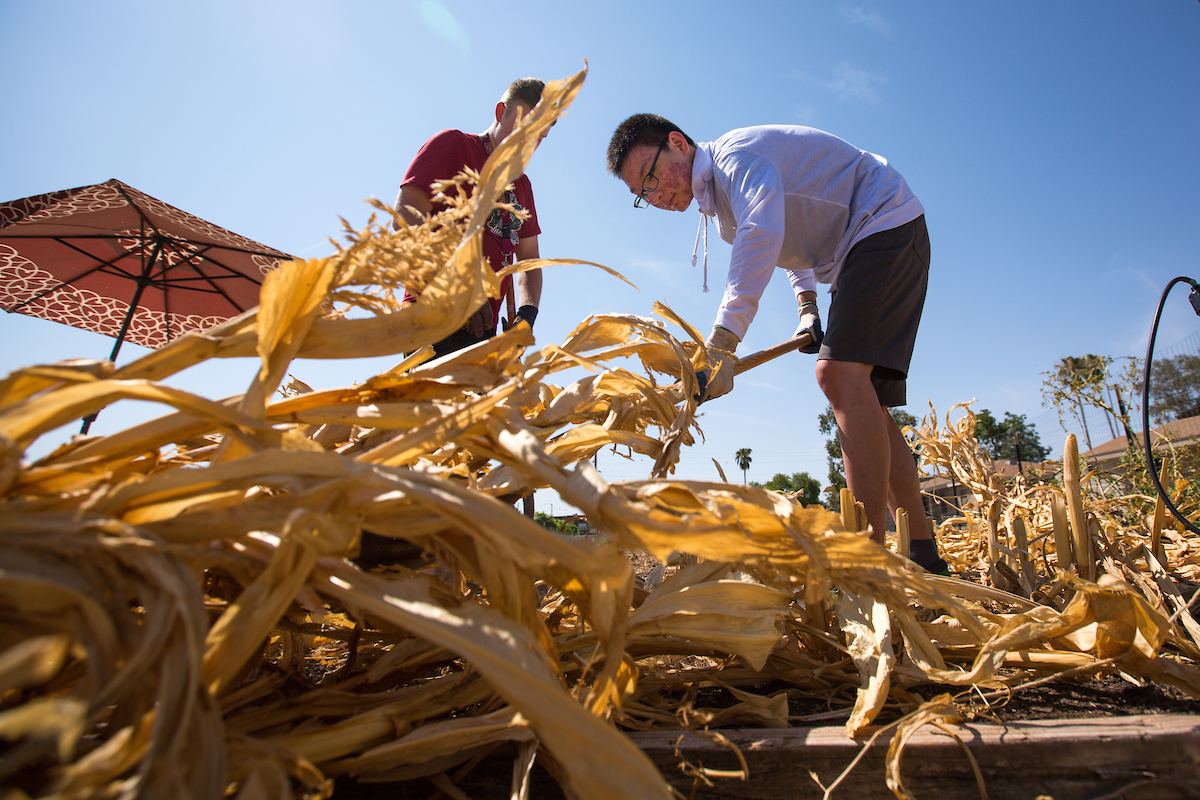Student projects make a big impact through Changemaker Sustainability Challenge
Arizona State University, already ranked #8 in sustainability performance among universities, is seeking to further innovate sustainability efforts in the community by funding student-launched projects.
For the 2019 fall semester, five teams were awarded a total of $6,013 in grants funded by the Sustainability Initiatives Revolving Fund to invest in projects that focus on implementing sustainable behaviors and practices within the Arizona State community during the spring semester.
Plant-based ASU ($1,500)
Resinate ($1,500)
Green Greeks ($1,500)
Empowered Beings, Empowered Planet ($1,000)
A Single-Use (ASU) Plastic Free Initiative ($513)

Students clear corn stalks out of the ASU Polytechnic Community Garden during a Changemaker Central Day of Service. Photo by Charlie Leight.
The Sustainability Challenge Grant is part of a larger initiative, the Community Action Grant program, which provides seed funding for Arizona State University students to further innovate their ideas and make an impact. The Sustainability Challenge supports projects that aim to discover and promote solutions in energy conservation, alternative transportation, food production, recycling and composting and plant-based diets.
Alyssa Orozco, who is a junior double majoring in global politics and English at Arizona State University, is leading the Empowered Beings, Empowered Planet project, which will bring in respected faculty from the university and professionals from the larger community to engage in discussions that shed light on the connections between the preservation of our environment and topics such as gender inequality, human trafficking and poverty.
Orozco said that holding discussions within an inclusive environment that values critical conservation and diversity is important and that there is a responsibility to take action on climate change, especially because the ASU community prides itself on innovation and sustainable development.
The grant will help Empowered Beings, Empowered Planet bring in guest speakers, rent space, provide refreshments and market the events to engage the campus community.
Orozco said that the idea for Empowered Beings, Empowered Planet came after listening to a podcast that connected the issues of overfishing and human trafficking. Orozco said it inspired her to find links between climate change and other human rights issues.
“This sparked the vision of my project and why I stand for our basic human right to feel empowered in our fight to protect our planet and confidence in our ability to will the change we seek,” Orozco said.
Álex Tuñas Corzón, a graduate student at the School of Life Sciences at ASU, is the leader of another Sustainable Challenge grantee, A Single-Use (ASU) Plastic Free Initiative. The goal of the project is simple: help promote the importance of using reusable plates, cups and utensils and reduce the consumption of single-use plastic products.
Corzón said he is focusing on implementing these strategies, as well as purchasing reusable plates and utensils using the grant funds, at events held by the School of Life Sciences.
“Last summer I had an ‘aha’ moment. I thought it was crazy the amount of plastic that was being wasted every day worldwide,” Corzón said. “In particular, I was very surprised with the amount of plastic that was being wasted in my school. We are biologists, ecologists, conservationists, and we should care more.”
Corzón said the project is unique because it’s effective in reducing plastic waste while also easy to incorporate into daily habits.
“It’s a low-hanging fruit because it requires minimal participation effort. You just have to bring your plates and wash them,” Corzón said.
Corzón, whose graduate research focuses on shark conservation in the Galapagos Islands, said simple actions are fueling large results. He said he’s already noticed students bringing reusable dishes to the school’s largest graduate gathering, the Brown Bag event. Corzón said the School of Life Sciences has even followed up by creating a sustainability committee for its executive board.
“People can repeat actions based on what they saw, and I think they can be powerful both individually and collectively,” Corzón said.
Students still have time to apply for the spring 2020 Sustainability Challenge grant. The application is already open, and the deadline is March 1. Follow Changemaker on Instagram, Facebook and Twitter for updates on Sustainability Challenge-related events.